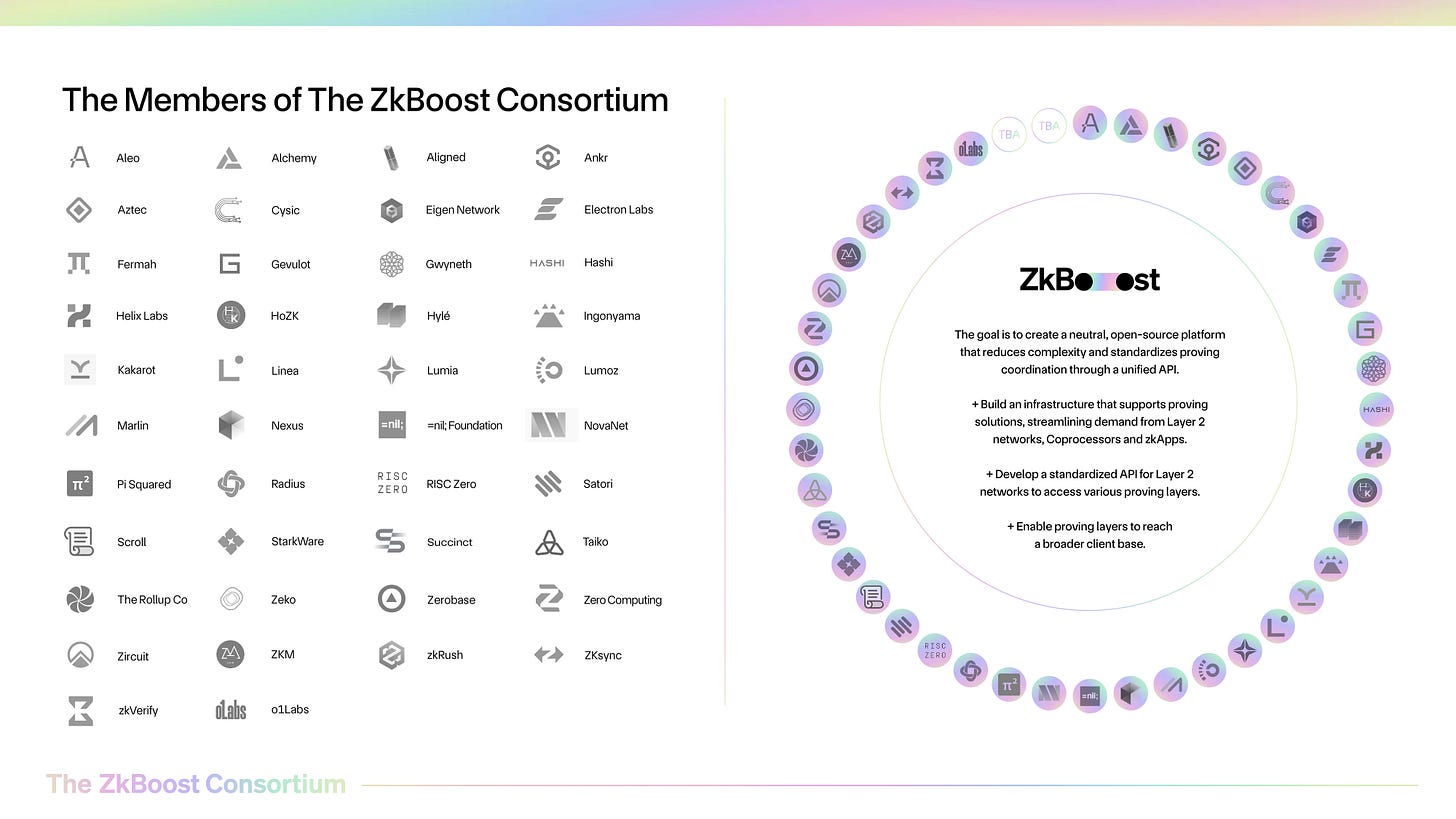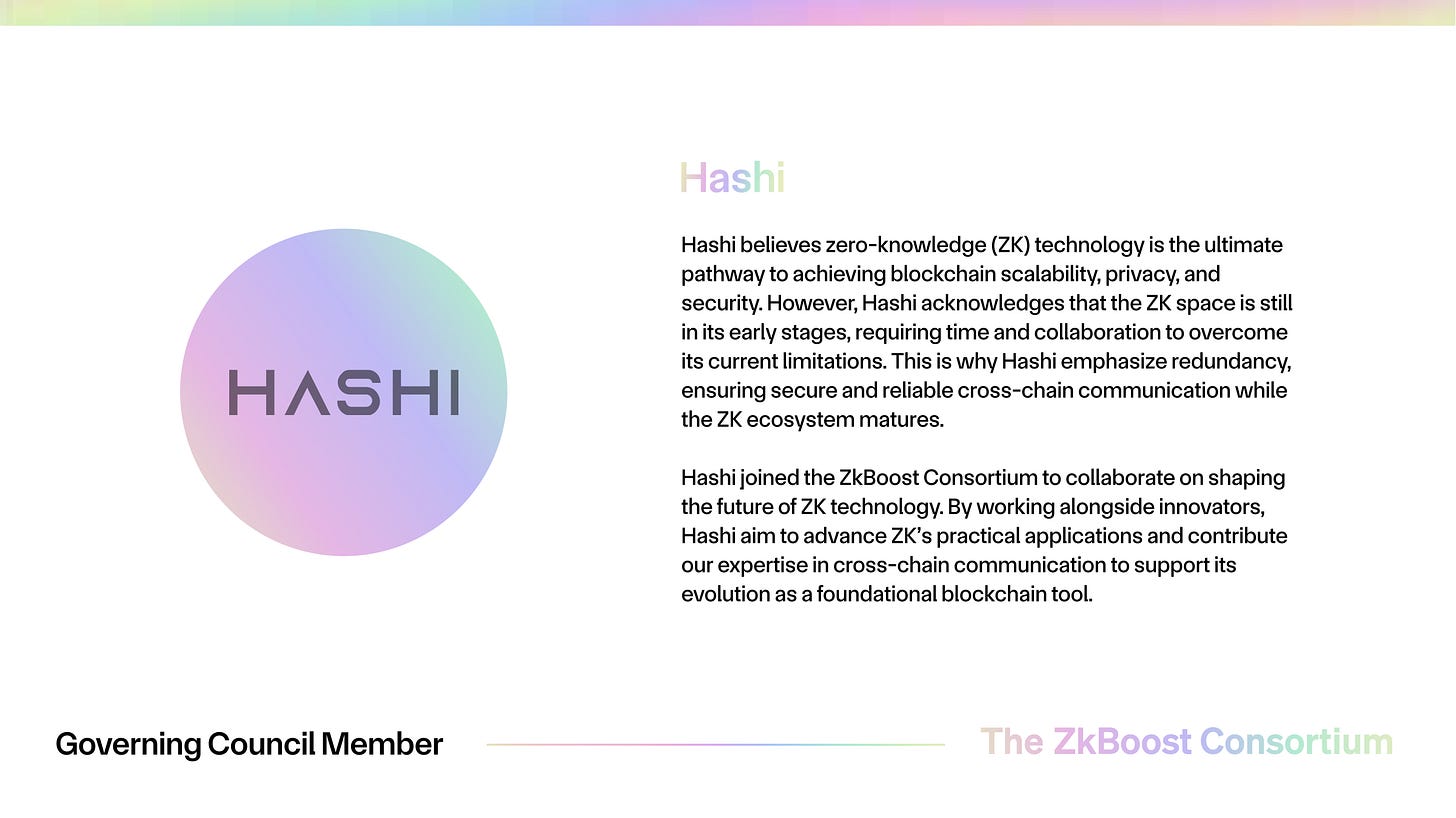Hashi joins the ZkBoost Consortium Governing Council
House of ZK joins the ZkBoost Consortium Governing Council
Interested in earning rewards to run nodes? You can sign up for the Not a Node Sale here to begin today. If you’re a project interested in renting ZK compute, start now with credits.
ZkBoost is a generic abstraction for outsourced proving. In practice, it is a kind of proxy node that proving services and networks can integrate with, providing a single, standardized API for projects in need of proof generation to access all proving options.
The purpose of the ZkBoost Consortium Governing Council is to collaboratively develop standards for proof supply chain abstraction. We invite all ZK-rollups and proving services to unite in architecting and funding ZkBoost, a generic abstraction for outsourced proving.
Currently, 42 companies have now opted to join the Governing Council, which consists of a diversified group of organizations and enterprises including Layer 1s, other major Layer 2 partners, and a multitude of prover networks. With a range of industry roles, all companies who have vowed to participate are collectively committed to governing and extending ZkBoost’s capabilities, with the core mission of bringing decentralization to the proof supply chain.
We’re excited to announce that HASHI, the additive security layer for cross-chain communication, has joined the ZkBoost Consortium. The Council Seat will be held by Georgios Gontikas, tech co-lead of Hashi. Georgios has co-founded and leads Hashi, focusing on enhancing cross-chain interoperability and security. He has also served as Head of Bridges at Gnosis, driving initiatives to improve the security and efficiency of blockchain bridges, such as the efforts on the zk Bridge. Previously, he was Product Lead at ChainSafe, where he led the development and launch of the Sygma interoperability protocol.
At Hashi, we believe zero-knowledge (ZK) technology is the ultimate pathway to achieving blockchain scalability, privacy, and security. However, we acknowledge that the ZK space is still in its early stages, requiring time and collaboration to overcome its current limitations. This is why we emphasize redundancy, ensuring secure and reliable cross-chain communication while the ZK ecosystem matures.
Looking toward 2025, we see ZK becoming a cornerstone of blockchain infrastructure, powering trust-minimized applications and enabling unprecedented levels of efficiency and privacy. Our focus is on preparing for this transition by integrating technologies like dendrETH, Spectre, and SP1 Helios—three ZK light clients that enhance cross-chain communication with additive security.
We joined the ZkBoost Consortium to collaborate on shaping the future of ZK technology. By working alongside innovators, we aim to advance ZK’s practical applications and contribute our expertise in cross-chain communication to support its evolution as a foundational blockchain tool.
ZkCloud is funding early work on ZkBoost, but our goal is for this to be a public good, open-source software. To formalize how this implementation should be governed to ensure neutrality, apply to join the Governing Council of the ZkBoost Consortium.
We’ll be announcing the rest of the Governing Council members weekly over the coming quarter, so stay tuned to learn more about the folks participating in this innovative initiative.
—
About Us:
ZkCloud, built by Gevulot, is the first universal proving infrastructure for ZK. Generate ZK proofs for any proof system at a fraction of the cost. Fast, decentralized and cheap.
Learn more about ZkCloud:
Website | Docs | GitHub | Blog | X (Twitter) | Galxe Campaign | Telegram | Discord
HASHI:
Hashi is an oracle aggregator focused on improving the security and flexibility of cross-chain communication. By combining inputs from multiple zk light clients and bridges, Hashi reduces reliance on single points of failure, acting as a “multi-sig of bridges” to validate cross-chain messages with redundancy. To achieve this, Hashi has built-in adapters for over 20 GMP bridges and ZK Light Clients.
Hashi also powers the State Sharing Network (SSN), a cross-chain state verification layer that relays block headers between chains. This enables developers to efficiently access and verify cross-chain states, and create smoother and safer cross-chain apps.
Learn more about HASHI:
Docs | GitHub | X (Twitter) | Telegram



